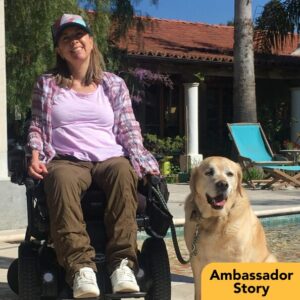February is Black History Month, an opportunity to delve into the unique challenges and triumphs experienced by African-Americans. Here are two client perspectives on coping with discrimination, holding onto hope and serving as a self-advocate for your health.
David A. Jeffers
David (above, with his wife Yasmine and sons) became paralyzed while at the beach with his family in August 2011. His family began fundraising with HelpHOPELive a month later.
Have you personally experienced or witnessed discrimination?
I’ve experienced discrimination both as a result of being black and as a result of being disabled. I have been treated as uneducated and unintelligent. People often choose to talk to my wife instead of me and ignore me, even when I address them directly. Little do they know that the black guy in the wheelchair is an active father, husband and mechanical engineer who graduated with the third highest GPA in my major.
How have you served as your own advocate?
Honestly, I’ve had to fight for almost every service I’ve used and the assistance I’ve received, including public transportation, rehabilitation and making sure neighborhood amenities are accessible. I document my experiences on my blog. I would advise others who face a similar struggle not to take ‘No’ for an answer. You must be persistent. For several issues I encountered, it took months to find a resolution.
What does Black History Month mean to you?
I wish we didn’t need to have Black History Month. I wish the history books and school curriculums could reflect events as they happened with a reverence for all cultures, but until that happens, it will remain an important month to me and my family.
What do you associate with the word ‘hope’?
A catastrophic injury like mine is truly life-changing. I could have died. As a quad, your whole approach to life has to change. You gain a totally new perspective on life. Hope gives me the ability to survive and thrive. Without hope, me and my family would not be as healthy or happy as we are today. My wife and kids are my main motivation and they help me find hope.
David is currently fundraising for Lokomat training ($85 per hour) and exercise therapy ($35 per hour) to improve his mobility. He has noticed a drop in strength and energy level since he stopped therapy in June of 2015 due to financial constraints.
Alison Jones
Alison (above, with son Alerique Dariso) was diagnosed with polycystic kidney disease (PKD) when she was seventeen. She is seeking a living kidney donor so she can receive a life-changing transplant. Alison and her son started fundraising with HelpHOPELive in June 2015.
Have you personally experienced or witnessed discrimination?
I have had to seek numerous medical opinions to get treatment. Organ transplantation was never included in potential treatment options as my kidney function declined. I had to initiate the conversation myself. After speaking with other African-Americans, the majority knew people who were on dialysis or had died on dialysis, but only a small percentage knew someone who had received a transplant. In comparison, when I speak with non-minorities, I often hear, “A friend of mine had a kidney transplant. You are going to be just fine.”
The most painful racism I have experienced: one Valentine’s Day while my son was enrolled in a private preschool, he drew a picture of his “valentine,” who had blonde hair. His teacher pulled him aside and told him he couldn’t have a blonde valentine. That incident shaped my parenting and I began to prepare my son for discrimination and teach him that no one can limit his choices in life.
Any advice for other people who are facing the challenges of PKD?
For anyone living with chronic kidney disease or PKD, I strongly suggest participating in a support group. My greatest life strategies have evolved during support group meetings. Speaking with others who are experiencing similar health experiences is therapeutic and helps you to avoid depression.
What does Black History Month mean to you?
Black History Month is a reminder that generations of people have overcome insurmountable obstacles through diligence and continuous effort. Black History Month reminds me that giving up is not an option.
African-Americans make up a minority within the general population, yet we face higher rates of hypertension, heart disease, diabetes and obesity. All of these conditions can lead to kidney failure. One of the reasons I am looking forward to receiving a kidney transplant is so I can teach and advocate for early kidney function testing and proactive health behaviors to change current health trends.
What do you associate with the word ‘hope’?
I am so thankful to all of my loved ones who have supported me during this journey. To me, hope is another day of breath and opportunity. Every time God gives me another breath, I want to make it count, and that is living hope. After my life, hope will be there for more generations to strive to reach their highest level of potential and opportunity.
Alison is fundraising for uncovered costs associated with her kidney transplant preparations, including the cost of a lifetime of post-transplant anti-rejection medications.
February is Black History Month, an opportunity to delve into the unique challenges and triumphs experienced by African-Americans. Here are two client perspectives on coping with discrimination, holding onto hope and serving as a self-advocate for your health.
David A. Jeffers
David (above, with his wife Yasmine and sons) became paralyzed while at the beach with his family in August 2011. His family began fundraising with HelpHOPELive a month later.
Have you personally experienced or witnessed discrimination?
I’ve experienced discrimination both as a result of being black and as a result of being disabled. I have been treated as uneducated and unintelligent. People often choose to talk to my wife instead of me and ignore me, even when I address them directly. Little do they know that the black guy in the wheelchair is an active father, husband and mechanical engineer who graduated with the third highest GPA in my major.
How have you served as your own advocate?
Honestly, I’ve had to fight for almost every service I’ve used and the assistance I’ve received, including public transportation, rehabilitation and making sure neighborhood amenities are accessible. I document my experiences on my blog. I would advise others who face a similar struggle not to take ‘No’ for an answer. You must be persistent. For several issues I encountered, it took months to find a resolution.
What does Black History Month mean to you?
I wish we didn’t need to have Black History Month. I wish the history books and school curriculums could reflect events as they happened with a reverence for all cultures, but until that happens, it will remain an important month to me and my family.
What do you associate with the word ‘hope’?
A catastrophic injury like mine is truly life-changing. I could have died. As a quad, your whole approach to life has to change. You gain a totally new perspective on life. Hope gives me the ability to survive and thrive. Without hope, me and my family would not be as healthy or happy as we are today. My wife and kids are my main motivation and they help me find hope.
David is currently fundraising for Lokomat training ($85 per hour) and exercise therapy ($35 per hour) to improve his mobility. He has noticed a drop in strength and energy level since he stopped therapy in June of 2015 due to financial constraints.
Alison Jones
Alison (above, with son Alerique Dariso) was diagnosed with polycystic kidney disease (PKD) when she was seventeen. She is seeking a living kidney donor so she can receive a life-changing transplant. Alison and her son started fundraising with HelpHOPELive in June 2015.
Have you personally experienced or witnessed discrimination?
I have had to seek numerous medical opinions to get treatment. Organ transplantation was never included in potential treatment options as my kidney function declined. I had to initiate the conversation myself. After speaking with other African-Americans, the majority knew people who were on dialysis or had died on dialysis, but only a small percentage knew someone who had received a transplant. In comparison, when I speak with non-minorities, I often hear, “A friend of mine had a kidney transplant. You are going to be just fine.”
The most painful racism I have experienced: one Valentine’s Day while my son was enrolled in a private preschool, he drew a picture of his “valentine,” who had blonde hair. His teacher pulled him aside and told him he couldn’t have a blonde valentine. That incident shaped my parenting and I began to prepare my son for discrimination and teach him that no one can limit his choices in life.
Any advice for other people who are facing the challenges of PKD?
For anyone living with chronic kidney disease or PKD, I strongly suggest participating in a support group. My greatest life strategies have evolved during support group meetings. Speaking with others who are experiencing similar health experiences is therapeutic and helps you to avoid depression.
What does Black History Month mean to you?
Black History Month is a reminder that generations of people have overcome insurmountable obstacles through diligence and continuous effort. Black History Month reminds me that giving up is not an option.
African-Americans make up a minority within the general population, yet we face higher rates of hypertension, heart disease, diabetes and obesity. All of these conditions can lead to kidney failure. One of the reasons I am looking forward to receiving a kidney transplant is so I can teach and advocate for early kidney function testing and proactive health behaviors to change current health trends.
What do you associate with the word ‘hope’?
I am so thankful to all of my loved ones who have supported me during this journey. To me, hope is another day of breath and opportunity. Every time God gives me another breath, I want to make it count, and that is living hope. After my life, hope will be there for more generations to strive to reach their highest level of potential and opportunity.
Alison is fundraising for uncovered costs associated with her kidney transplant preparations, including the cost of a lifetime of post-transplant anti-rejection medications.











